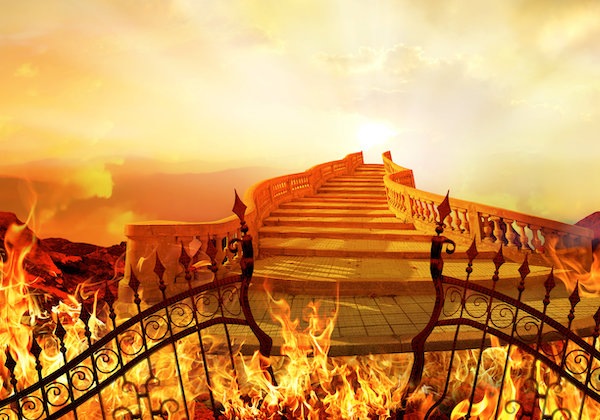Hell Grows Out of God’s Love Not His Justice
Mental pictures of hell fascinate people, but those pictures eventually make people ask “Why does God allows such a place as hell? Why not just send the wicked into oblivion?” It seems so brutal. In an old joke, a street preacher lights a match in front of a crowd and shouts, “What does this remind you of?” Then loudly warns the people that if they don’t repent they’ll burn!

The Ancient Egyptians believed the goddess Ammit burned and then devoured the evil dead. The living placed a copy of Egyptian Book of the Dead in the coffin to give help their deceased loved ones avoid condemnation by the gods. For the Greeks, it was “Tartarus,” a dungeon below Hades where cowards and the most evil went.
Dante and His Nine Circles
In Christianity, the most vivid picture comes from Dante’s “The Inferno.” Dante pictures nine circles of hell where the torments increase in severity as severity of sin increases. Surprisingly, the bottom of hell is not a “fire” but a “frozen lake” where people exist in a catatonic-like state.1
Though few today read Dante’s work, his vision of hell is what those in the west think of–even atheists. But is this really the Bible’s picture? To be fair, Dante was a poet and poets use metaphors to express ideas. He may have expected readers to understand what he wrote as symbol not reality.
The Problem This Creates
But this creates a problem for Bible readers because the Bible uses metaphors to describe hell. I believe, however, it uses them as any poet does. The “outer darkness,” “weeping and gnashing of teeth”2 and “fiery furnace” passages3 do not mean hell is actually a furnace with dark fire. The Book of Revelation doesn’t not mean God actually uses literal burning sulphur to torment those who worship the Beast.4 The “Lake of Fire” is not a briny caldron to cook sinners.5 Not only does this cheapen the meaning, but makes us wonder as why God allows a hell that seems vindictive and petty.
Interpreters Who Want It Both Ways
However, many still hang on to these ideas. And yet if pressed about other images in the context, they deny a literal interpretation. For instance, the burning sulfur passage in Revelation 14 follows a chapter where a dragon stands on the sea shore and a beast comes out of the waters. Most concede that Satan is not a literal dragon but an angel who is only like a dragon. They claim the beast from the sea is a metaphor for an evil kind of person. But just a few paragraphs later, they insist on a literal meaning.
Why This Happens
Many believers think that only a literal interpretation of Hell’s torments preserve the gravity of God’s judgment. But a closer look reveals that seeing these images this way actually lessens the impact. Understanding the real intent of Bible metaphor actually better preserves the true horror of hell. More importantly, it will also better answer the question “how can a loving God allow this?”6
Outer Darkness/Weeping and Gnashing of Teeth
The first thing to observe in Jesus statement that “there will be weeping and gnashing of teeth,” are the words “there will be.” Jesus is speaking of what the situation causes not what God is doing. God dismisses unrepentant sinners from his presence—“away from me, you evildoers”7—or cast them there.8 Darkness used metaphorically in the Bible refers to absence of understanding, particularly of God.
Proverbs 9:10 says “the fear of Lord is the beginning of wisdom and knowledge of the Holy One is understanding.” When people don’t know God they “walk in deep darkness” and “don’t know what makes them stumble.”9 Jesus is the “light of the world.”10 He admonishes his disciples to “walk while you have the light before darkness comes.”11 All this suggests that “darkness” refers to the “absence” of the knowledge of God, which is what hell actually is. The condition of God’s absence is what causes the weeping and gnashing of teeth. God doesn’t create it to be this way, he allows hell to be this way by giving people what they demand.
Longings That Drive Us
A quote usually attributed to G.K. Chesterton but actually written by Scottish writer Bruce Marshall in his 1945 novel, The World, the Flesh and Father Smith is helpful. Father Smith counters a woman who says that religion is merely a substitute for sex. “I prefer to believe that sex is a substitute for religion and that the young man who rings the bell at a brothel is unconsciously looking for God.” The force of the thought is that our desires for anything in this world is actually and unconsciously a desire for God. Rene Pascal’s wrote in his work Pensees:
“…there was once in man a true happiness of which there now remain to him only the mark and empty trace, which he in vain tries to fill from all his surroundings … but these are all inadequate, because the infinite abyss can only be filled by an infinite and immutable object, that is to say, only by God Himself. 12
God Allows Himself to Be Absent From Hell
Outer darkness is where what people desire the most, that is God, is completely unavailable. Therefore, their true desire can never be satisfied. Proverbs 13:12 states, “Hope deferred makes the heart sick.” If deferral makes one sick, what would permanent loss do when countless ages and millions of failures evaporates hope completely? Wouldn’t despair become unbearable? Hell is this way not because God wants this for us, but he allows us freedom. Genuine love demands no less.
The Lake of Fire
In a general sense, “fire” when use metaphorically in the Bible has three basic referents. First, fire as a metaphor tests the quality of something. Secondly, it pictures the uncompromising and deadly nature of God’s holiness toward unrepentant sin. And lastly, it refers to uncontrolled human desire.
Testing
A crucible separates silver or gold from impurities, therefore it tests the true value of a hunk of metal. In the book of Proverbs, God like a crucible tests people’s hearts to show whether what they look like on the outside matches what they really are.13 In the New Testament, fire tests the quality of a Christian minister’s work.14
God’s Holy Presence
Secondly, fire represents God’s presence in the burning bush. God tells Moses to take off his shoes because the ground he is standing on is holy.15 A pillar of fire rests over the tabernacle where only the priests can approach and only under certain conditions.16 Fire from God consumes Aaron’s sons Nadab and Abihu for offering “unauthorized fire” to God.17 On anther occasion, thousands of Israelites die by fire from the Lord because they grumbled against him in the wilderness.18 These passages cause many to conclude the fires of hell are God’s fierce judgment.
Of the above, the first sense seems unlikely since God would be testing the work or heart of someone expelled from his presence. The second also becomes unlikely when one notes context of those passages. In each case, judgement ensued when someone comes into God’s presence in an unholy manner or speaks evil “in the hearing” of the Lord as in the event of Israelite grumbling. God is not only not present to those in hell, he erases them from his knowledge.19
Fire As “Human Passion” Makes Sense
This leaves the last sense: uncontrolled human desire. The Apostle Paul in speaking of marriage says, it is “better to marry than to burn.”20 The Bible does not clearly designate desire as what “lake of fire” refers to. But a literal interpretation really does reduce God to seeking petty and inadequate justice. Metaphor makes more sense and desire is the best referent. And if we see the “lake of fire” as humanity burning with uncontrolled desire, several things fall into place.
First, since sin is a feeble attempt to replace God with “created things,” desire grows like an addiction. Compulsive behaviors do not satisfy but provide a temporary fix compelling the person to seek it again and again. Each time disappointment returns in increasing magnitude, eventually ending in despair. The frustration of separation from the true object of desire would lead to “weeping and gnashing of teeth.” And the weight of despair might very well end in a mindless catatonia for respite—not incompatible with a “second death”21 and not far off from Dante’s frozen lake.
Engines of Power
Neither atheists nor believers fully appreciate the consequences that result from which engine of power authority uses. There are only two. The world uses coercion applied through various forms of violence to enforce law. Police departments and armies use physical violence or the threat of it. But coercing businesses or people with blackmail or defamation is also violence. Extorting someone’s cooperation by threatening to harm liberty or happiness is another form.
In the Bible, this engine spreads after Adam and Eve’s rebellion. Cain kills his brother Abel,22 then a man named Lamech kills a someone for “wounding him.”23 By the time we get to Noah, the world is nothing but violence continually24 and it’s what drives Nimrod and the Tower of Babel.25
Authority in the kingdom of God, however, is love—even for enemies.26 God never coerces people, even to get them to love him in return. Love can only be offered freely. But freedom implies the possibility of rejection. Rather than coerce, God woos and draws people27 by being good to them.28 He doesn’t want any to perish but wants all to come to repentance.29 However he doesn’t force what he wants
Out of Love God Allows Hell
That leads to an interesting and unavoidable conclusion: God allows people to go to hell out of his love for them because that is what he is. Whatever we say about God’s justice it cannot conflict with the fact that he is love.30 He does all he can to persuade people against it. But if they remain adamant after all his attempts, he gives them what they demand: a God-free existence. They now live forever in the corrupted state God initially took steps to prevent. After Adam and Eve sinned, he placed an angel with a flaming sword blocking access to the tree of life.31 Eating from that tree would have made redemption impossible. But after making reconciliation possible and passionately offering it to us, God allows the possibility some will decline his offer which ends in hell.
God Allows the Place, Sin Makes It Hell
In Act II of Oscar Wilde’s play An Ideal Husband, the character Sir Robert Chiltern famously says “when the gods wish to punish us they answer our prayers.” At first glance, God giving what the world demands does not seem like judgment, but we should think again. In that godless outer darkness, force will be the only engine of power among the inhabitants. Those not in power will forever be under a totalitarian thumb. And those in power will be paranoid, constantly looking over their shoulder. Others will want that power. Everyone becomes alienated from everyone else.
Additionally, nature’s uncontrollable forces will alienate them from creation. And because unquenchable desires rule them, despair alienates them even from themselves. Add to this the utter eternal hopelessness that change is even possible and it is more than devastating, it’s unimaginable. Consider the weighty words of C.S. Lewis:
In some sense, as a dark to the intellect as it is unendurable to the feelings, we can be both banished from the presence of Him who is present everywhere and erased from the knowledge of Him who knows all. We can be left utterly and absolutely outside–repelled, exiled, estranged, finally and unspeakably ignored.32
C.S. Lewis, “The Weight of Glory
This is not something God wants or predetermines for people as some have asserted. God only allows hell as a destination for those too obstinate to acknowledge that he only possesses life and only he preserves it.
- Dante Alighieri, The Divine Comedy, Cantos 33-34
- Luke 13:28
- Matthew 13:42
- Revelation 14:10. The beast they worship is described in Revelation 13:2-10.
- Revelation 20:14
- The typical answer to the question “How can a loving God allow this?” is that God is a God of justice as well. While this may be true, our understanding of how justice is to be carried out distorts what it means for God to be just. Our understanding prays on how we desire our enemies comeuppance and though we say we are leaving vengeance up to God, we define it in terms of getting even: “God Will Getcha.” As we will see in my argument, this conflicts with Jesus command that we “love our enemies.” It will also show that our definition of vengeance is both petty and inadequate and makes God out to be correspondingly vindictive on the one hand and impotent on the other.
- Luke 13:28, Matthew 25:41.
- Matthew 8:12, 13:42, 50, 22:13 and 25:30, however all but Matt 8:12 are found in the imagery of a parable.
- Proverbs 4:19
- John 1:4, 8:12
- John 12:35
- Rene Pascal, Pensees, Chapter VII, “Morality and Doctrine” SECOND part, location 3425 in Kindle Version Blaise Pascal, Works, The Perfect Library. This is often misquoted as “Within the heart of man there is a God-shaped vacuum that cannot be filled by any created thing but only by God the Creator.
- Proverbs 17:3.
- 1 Corinthians 3:12-15.
- Exodus 3:5
- Exodus 28:42-43, et al.
- Leviticus 10:1-3
- Numbers 11:1
- Matthew 7:23, Luke 13:25-27. Paul’s interesting statement in 1 Corinthians 8:3 about those who love him being known by God. C.S. Lewis makes the observation that this implies that those who don’t love God will be ignored by him. See C.S. Lewis, “The Weight of Glory” in The Weight of Glory and Other Addresses, p. 41-42
- 1 Corinthians 7:8-9
- Revelation 20:14
- Genesis 4:8
- Genesis 4:23-24
- Genesis 6:11
- Genesis 11
- Matthew 5:43-48
- John 6:44
- Romans 2:4; see also Acts 17:24-28, Matthew 5:45
- 2 Peter 3:9
- 1 John 4:8. Love is not just something God does because he is a good guy. Love is the foundation of life itself. God is not just the source of life but the embodiment of life because the Godhead has always existed and always loved perfectly. The Father loves the Son and puts all things under his feet. The Son loves the Father and says “not my will but thine be done.’ The Spirit never speaks on his own but only what he hears from the Father and the Son and the Father and the Son never do anything except through the Holy Spirit. Love is life. Separation/alienation is death. See Genesis 2:18.
- Genesis 3:22-24
- C.S. Lewis, “The Weight of Glory,” p. 42. Italics original..






